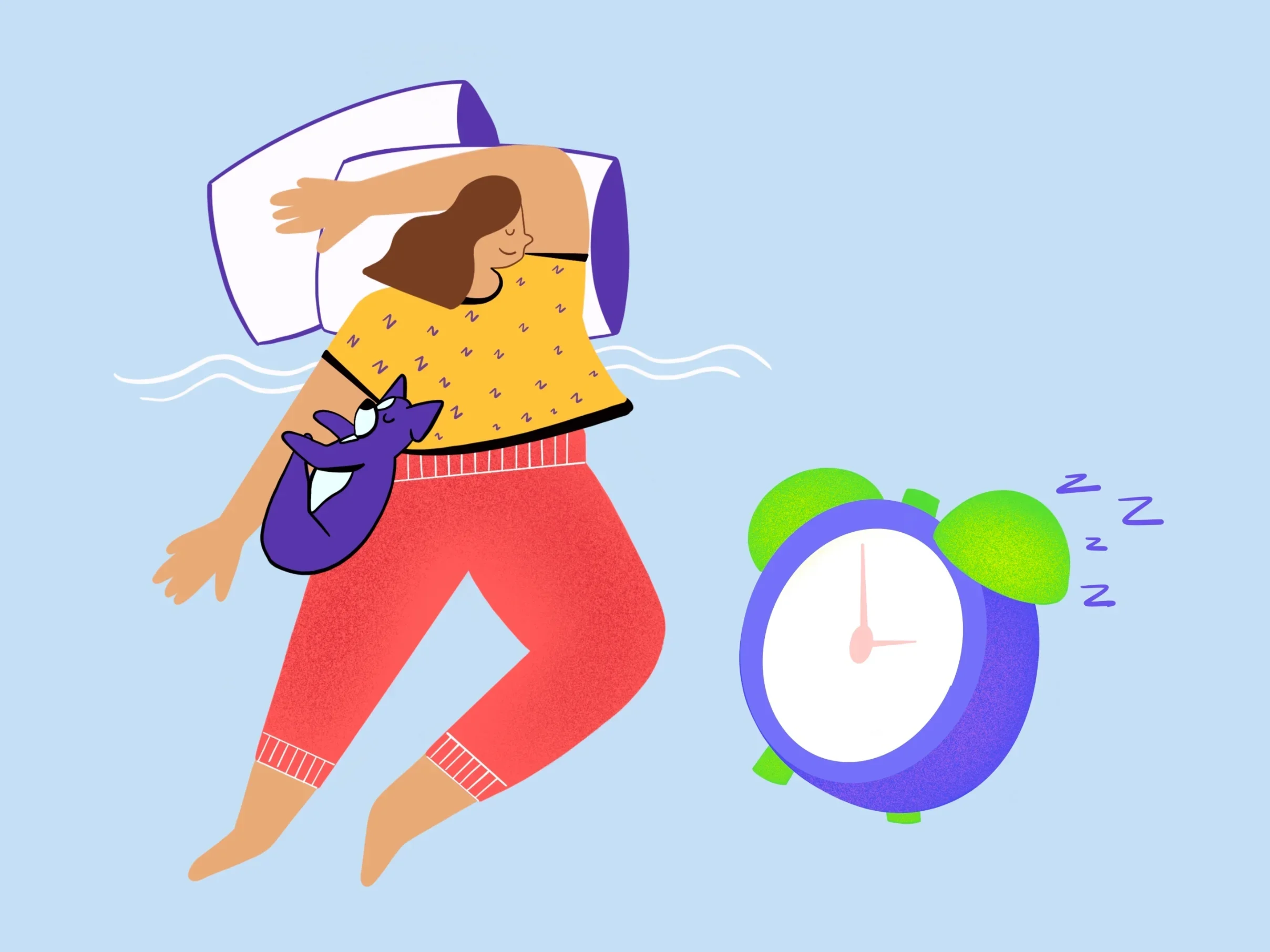Sleep Health
Published February 22, 2022
11 minOversleeping - How Much Sleep Is Too Much?
We have all heard the saying, ‘too much of anything is good for nothing.’ And this is true even when it comes to sleeping. While a good night’s sleep is truly vital for your health, oversleeping can l

Table of contents
What Is Oversleeping?How Much Sleep Is Too Much?What Causes Oversleeping?Side Effects of OversleepingHow to check for Oversleeping Symptoms8 Tips to stop oversleeping:ConclusionFrequently Asked Questions
We have all heard the saying, ‘too much of anything is good for nothing.’ And this is true even when it comes to sleeping. While a good night’s sleep is truly vital for your health, oversleeping can lead to many medical problems such as diabetes, heart disease, and more. So, how much sleep is too much sleep? Is oversleeping bad? Is oversleeping a real thing? What happens when you oversleep? We are here with all the answers; read ahead.
Not sure which mattress fits you best? Find out now.
What Is Oversleeping?
The amount of sleep you need depends on your age, health, and activity levels. An average adult should sleep 7 to 9 hours a day. However, sleeping duration is more for teenagers and children. Now, if you sleep more than 8 or 9 hours in a day, it can be categorized as oversleeping. Oversleeping may be due to a medical condition or an unhealthy lifestyle. When you sleep for more than nine hours in a day, then the condition is known as hypersomnia. This condition can also cause excessive sleepiness during the day, even after sleeping for a long time.How Much Sleep Is Too Much?
Everybody’s sleep needs are different, and it varies from one individual to another. It is usually recommended to get at least 7 to 9 hours of sleep. However, if you need more than 8 or 9 hours of sleep for complete rest, it can be an indication of some underlying condition. Therefore, it is important to speak to a doctor if the sleepiness prolongs.Your age, medical conditions, and activity level play a huge role in deciding that.- Infants and children usually need to sleep more than adults.
- People with medical conditions like depression sleep more or less than required.
- A highly active person sleeps more to rest their body.
Normal Sleeping Hours As Per Age
If a person sleeps more than required, he/she is suffering from excessive sleeping.| Age | Hours of Sleep Per Day |
|---|---|
| Newborn Baby | 14-17 Hours |
| Infants | 12-15 Hours |
| Toddlers | 11-14 Hours |
| School Children | 9-11 Hours |
| Teenagers | 8-10 Hours |
| Adults | 7-9 Hours |
What Causes Oversleeping?
Do you often ask yourselves, ‘Why do I sleep so much?’ Often our stress level, health condition, and physical activity level can be reasons for oversleeping. You must have heard of insomnia, the inability to fall asleep. Hypersomnia, on the other hand, is if someone sleeps more than needed. This can be one of the causes of oversleeping. According to NCBI, hypersomnia is a medical condition faced by 4-6% of the population. People suffering from hypersomnia sleep for hours during the daytime, and napping is insufficient. People with the disease face symptoms like anxiety, low energy, and memory problems. Another disorder, Obstructive Sleep Apnea, causes breathlessness during sleeping, leading to feeling lethargic and sleeping for more hours. Sleeping disorders are not the only reason causing oversleeping. Other factors like alcohol, depression, and medications can make you sleep for longer hours. And some people oversleep only because they love to or are addicted to sleep!Side Effects of Oversleeping
If you are not sleeping for the optimal hours, you invite various health problems. Some of the negative effects of oversleeping include;- Fatigue
- Headaches
- Obesity
- Diabetes
- Depression
- Increased Risk of Death
How to check for Oversleeping Symptoms
When you oversleep, there are a few other symptoms you may experience other than sleeping for long hours. They include;- Less Productive
- Low energy
- Anxiety
- Memory issues
- Extreme sleepiness
- Extreme fatigue
8 Tips to stop oversleeping:
Once you know the problem, it’s easier to cure it. If you have had sleep-related issues for more than six weeks, we recommend seeing a sleep expert. The doctor will ask questions about your sleeping habits, lifestyle, diet, and medications. So, how to feel better after oversleeping? How can one overcome oversleeping? Some oversleeping cures include;- Keep track of your sleep cycle
- Have a sleep diary
- Take a polysomnogram
- Take multiple sleep latency tests
- Expose yourself to sunlight as soon as you wake up
- Avoid oversleeping on weekends
- Try getting enough sleep during the night
Conclusion
If you are taking care of your lifestyle, eating habits, sleep schedule and everything else, and still feeling the urge to sleep more, you should plan a visit to a doctor. Everybody loves to sleep, but oversleeping, in the long run, is not suitable for your health. If you can’t stop oversleeping talk to your doctor today!This article is for informational purposes and should not replace advice from your doctor or other medical professional.Frequently Asked Questions
How to take a short nap without oversleeping? Take a nap in the early afternoon.Do not take a rest for longer than 20 minutes.Do not replace napping with caffeine. Is 6 hours of sleep enough? So, is 6 hours of sleep enough? No. A healthy adult should sleep at least 8 hours. Kids and teenagers should sleep more than adults. Read more about the harmful effects of 6 hours of sleep. Does oversleeping cause headaches? Yes, headache is one of the prominent side effects of oversleeping. Headache from oversleeping can be avoided by following a routine. Is oversleeping a sign of depression? Yes. Other signs of depression are;- Fatigue
- Insomnia
- Change in appetite and more.











